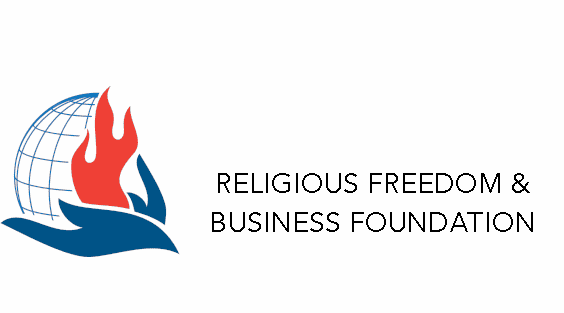Why the Religious Freedom and Business Foundation Fails to Promote Freedom and Undermines the Foundation of Businesses
by Ed Buckner
Along with other atheists, I have been involved in efforts by the national Religious Freedom Center — “a nonpartisan national initiative focused on educating the public about the religious liberty principles of the First Amendment” — and I am committed to true liberty of conscience for everyone. Atheists like me also share strong knowledge of and support for First Amendment requirements for separation of religion and government. While what I write here is very much about religious liberty, it is not primarily about church-state separation.
Imagine that you are a leader of Widget, Inc.—a manufacturer with 1,000 employees. Fifty of these are stamp collectors and would work harder if their hobby was granted some time and recognition by Widget, Inc.; fifty are members of the local Ku Klux Klan and would work harder if their chapter was granted some time and recognition by Widget, Inc.; fifty are members of the local Republican Party and would work harder if their group was granted some time and recognition by Widget, Inc.
Should any of these groups get the company’s attention and support? If one should but not the others, on what grounds?
I didn’t include, above, any religious sect. Any religion-related group includes, inevitably, the seeds of unresolvable conflict—this is true for all Christian, Muslim, or even Buddhist groups (as we have sadly learned in Myanmar over the persecution of the Rohingya Muslims). And it’s true even for an atheist group. Do all such people—certainly including atheists, freethinkers, and secular humanists—have and deserve liberty of conscience and the right to practice (within very broad limits) their religion or irreligion? Certainly! Do they need support from their employers to do so? No.
The Religious Freedom and Business Foundation (RFBF), led by a bright, capable, gracious guy named Brian J. Grim, disagrees. RFBF, to which I was introduced by the Religious Freedom Center, is a powerful, well-funded, international organization that is working damned hard to convince businesses and the rest of us that faith/religion belongs in the workplace because they claim this benefits employees and businesses mightily (if faith is introduced and supported wisely).
RFBF has consistently invited nontheists of various stripes to participate in their efforts, giving clearly-identified atheists speaking slots and encouraging the establishment, in workplaces, of non-religious groups in parallel with the religious ones. “Tolerance for all, discrimination against no one” seems to be the consistent theme of RFBF. If businesses include “nones” among the employees they encourage and support, does that obviate the risks and disadvantages to encouraging and supporting Muslims or Jews? I may be alone among atheists publicly commenting on this, but I say, “No!” It is clearly much better to include the irreligious if such a project is undertaken, but the project is still a really bad idea. There are, beyond any reasonable doubt, serious risks to having businesses encouraging and supporting religious and irreligious groups. Are there benefits to businesses of getting involved with questions of religion? Probably—but are those legitimately related to the purposes of the business? I argue not.
Bringing religion into the workplace can be compared to bringing religion into the public schools. There are serious risks to liberty to either, but at least there is a reasonable place in the schools—high school students probably should learn about many religions, just not have any promoted as true or desirable.
The basic question is whether it makes any sense for a widget maker (or AT&T or the mom-and-pop corner shop) to get entangled with unrelated matters, including religion, at all. Stamp collectors and Republicans have every right to organize and engage in their interests, but it really is not the proper business of businesses to encourage or discourage their efforts. Probably there are no ardent anti-stamp-collectors to worry about, but other groups—the GOP, the KKK, and, yes, every religious or non-religious group, do incur vigorous opposition, opposition unrelated in most cases to the business’s purpose. (Most businesses do have much to lose from racism, so any real or perceived support for the KKK could directly undermine the business.)
But if the KKK chapter can be dismissed as harmful to a business and the stamp collectors as at least harmless, what of the Republicans? Can a political party generally considered as at least an acceptable political alternative be helped without hurting a business? Wouldn’t that risk alienating staff and customers who are Democrats (or socialists or libertarians) even if it strengthened support by GOPers? And why?— the staff members who are ardent Republicans certainly have sufficient power to join the GOP and work for the party without their employer’s help.
Having a business support a religion is in fact worse than supporting a political party—it is completely unnecessary for the adherents, who—in America—have complete freedom to believe and practice. And it risks anger and opposition from the vast majority who do not believe as that sect does. And, more even than with political differences, religious differences are often quite emotional and cannot be resolved by appealing to logic and evidence. What’s more, and this can be a major problem, your boss may well disagree with you on this stuff and you may never even know what the consequences of that knowledge are.
If supporting religious and irreligious religion-based groups at work may help the business (by stirring gratitude and loyalty from those whose groups are supported), it does so illegitimately. Such efforts by businesses seem merely designed to exploit workers and to do so in the name of tolerance.
Americans—all of us—have religious liberty, and we do not need religious tolerance from employers. None of us need our employer’s permission to believe as we think best, and it may well be in our interest for the boss not to even know what we believe.
As one of our great founding fathers, Thomas Paine, put it in the Rights of Man (1791), which he addressed to George Washington,
Toleration is not the opposite of intolerance, but is the counterfeit of it. Both are despotisms. The one assumes to itself the right of withholding Liberty of Conscience, and the other of granting it.*
Irreligious people hold the complete range of political views, from anarchists to leftists to libertarians. But when it comes to matters of conscience, all reasonable people should be libertarians, not just tolerant.
Atheists should cooperate with religionists, should ally with theists on all sorts of things, including improving understanding of religion and of atheism. And atheists should counter religiosity in any time or public place where anyone is trying to impose religiosity on us. When there is an appropriate societal or political “table” to gather around to consider matters of importance, atheists should have a seat there—should be grateful when we’re offered one and should demand one if we’re not.
Except for religious workplaces, no workplaces are the right places for religious or irreligious groups.
*Paine, Thomas. The Rights of Man (1779; reprint, New York: Heritage Press, 1961), p. 215.
 ED BUCKNER is an American atheist activist who served as president of the organization American Atheists from 2008 to 2010. He served as executive director for the Council for Secular Humanism from 2001 to 2003 and was once the Council’s southern director. As treasurer of the Atlanta Freethought Society, he led a protest at a 2007 rally organized by Georgia Governor Sonny Perdue to pray for rain. He and his son, Michael E. Buckner, wrote In Freedom We Trust: An Atheist Guide to Religious Liberty published by Prometheus Books in 2012. Buckner lives in Atlanta.
ED BUCKNER is an American atheist activist who served as president of the organization American Atheists from 2008 to 2010. He served as executive director for the Council for Secular Humanism from 2001 to 2003 and was once the Council’s southern director. As treasurer of the Atlanta Freethought Society, he led a protest at a 2007 rally organized by Georgia Governor Sonny Perdue to pray for rain. He and his son, Michael E. Buckner, wrote In Freedom We Trust: An Atheist Guide to Religious Liberty published by Prometheus Books in 2012. Buckner lives in Atlanta.















